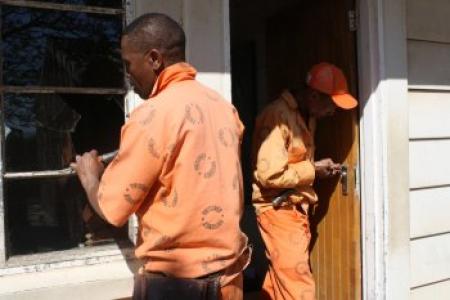
Almost 3,000 convicts are released from prison each month in South Africa and rejected by society. The past cannot define the future as communities try to support ex-convicts released back into society. In many instances, society rejects convicts forcing ex-convicts to go back to prison.
The conditions of South African prisons are appalling, dirty, unhygienic, overcrowded and ruled by gangs. Criminals placed into the prisons have little or no chance of rehabilitation. Gangs operating within the prison structures affect people who want to rehabilitate. The trauma of spending months and even years in South African prison does not disappear when the inmate is released back into society. The rehabilitation during jail time is not sufficient to escape the harm experienced within the prisons. Gang leaders within the prison walls operate in conjunction with criminals on the outside, thereby ensuring crime continues as forceful as before. Often there is no hope of leading a crime free life upon parole.
There are rehabilitation programs providing support and therapy for prison convicts both within prisons and in society. The change must come from within and choices need to be made. Prisoners are encouraged to have a positive attitude toward life, attend rehabilitation and stay away from crime. The optimistic approach of criminals leaving prison soon dwindles away as rejection by society becomes a reality of a harsh world for most.
Offering support for prison convicts becomes nearly impossible with residents preferring not become involved. The obstinate attitude of society often leads to the prisoners entering the criminal surrounds in an attempt to survive. Drugs are often a cause of repeated crime by ex convicts.
South Africa is a racial stereotype country and goodwill within communities’ lack trust. The rise of crime does not help prison convicts to enter society and live an ordinary life. Prison convicts often meet with rejection from companies when seeking employment and this demoralizing impression forces most to return to crime. The high unemployment levels within South Africa is another factor in convicts’ inability to find work.
The stigma attached to ex-convicts is a major problem causing rejection from society. Prison convicts often believe that the rehabilitation received does not lead to an active role in society. Community organization can assist former prisoners through spiritual guidance and skills development. By doing so, they would be raising hope of leading a life without crime for ex-convicts. Trust is often the cause of failure within communities dealing with former inmates. The tarnished reputation of prison convicts leaves little hope for the future.
The reintegration into society for prison convicts is difficult. In South Africa, many people believe that offenders should not be allowed early parole and struggle with forgiveness. The eye-for-an-eye mentality indeed exists in South African communities. Prison prisoners serve time in prisons and overcoming the public’s judgmental perception is often the most difficult trauma for ex-convicts to bear. Rejected by society after serving a prison sentence in South Africa for crimes committed is often a harsh criticism for prison convicts to understand.
Read more at http://guardianlv.com/2014/10/prison-convicts-rejected-by-society-in-south-africa/#IrODeSHOSEYABvyS.99
No comments:
Post a Comment